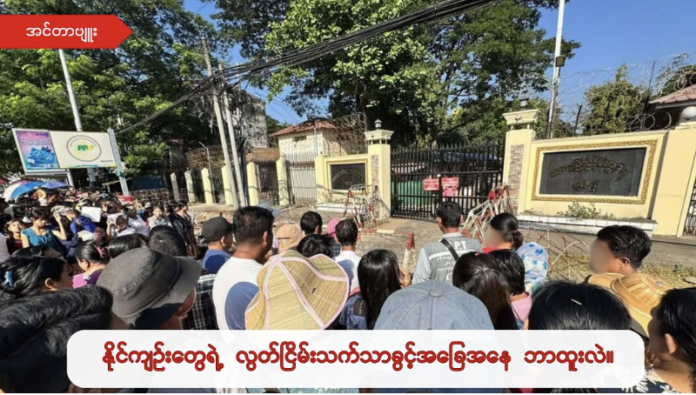An interview with Ko Thike Tun Oo, an official of the PPNM, about the inclusion of political prisoners in the list of the persons granted amnesty by the military council.
The Political Prisoners Network – Myanmar (PPNM) reported that only 344 political prisoners were granted amnesty and released from various prisons across the country by the military council on Independence Day on 4 January.
The military council said that 600 political prisoners, arrested and prosecuted under Section 505, were among those released. However, the PPNM has reported a discrepancy, noting that the actual number of releases on the ground is lower than claimed.
Than Lwin Times interviewed Ko Thike Tun Oo, an official of the PPNM, about the decline in the number of political prisoners released under the amnesty and the current conditions of political prisoners in detention.
Q: To begin with, what is the current situation of the political prisoners released under the amnesty granted by the military council on 4 January?
A: Based on our data, at least 344 political prisoners were released. Even if some lists from certain areas are not included due to various factors, we believe the total number will not exceed 400. According to our records, 344 political prisoners were released, which is significantly lower than the number claimed by the military council.
Q: Compared to previous occasions, has the number of political prisoners granted amnesty increased or decreased?
A: When we look at the total number of political prisoners freed, the percentage of those granted amnesty is very low, often less than 10 percent. In some cases, it is only three or four percent of the total number released. In certain months, no political prisoners were included in the amnesty lists at all. The largest release of political prisoners occurred on 3 May 2023, the highest number since the coup, with over 2,200 individuals reportedly freed. However, it is difficult to confirm how many of these were actually political prisoners. I would like to emphasize that this should be re-examined, as the military council’s statement appears to be one-sided.
Q: Are there any prisons across the country where the military council’s amnesty did not apply to political prisoners? What is your view on this?
A: There are prisons where the military council’s amnesty did not apply, such as Loikaw Prison, Sittwe Prison, Bhamo Prison, Gangaw Prison, as well as Maubin and Pathein Prisons in the Ayeyarwady Region. In my view, the junta refrained from releasing political prisoners in areas with high military tension. It can be inferred that the military council did not release political prisoners from these locations because they have a relatively small number of detainees. The military council itself will know best about this situation. Political prisoners are arrested and tortured in prisons. No one should be in prison. As long as the military council faces setbacks, it appears they continue to arrest and detain individuals for their own political gain. Revolutionary forces will target the prisons where political prisoners are held. We believe and anticipate that in 2025, there will be many instances where political prisoners are freed.
Q: Why is there a gradual decrease in the number of political prisoners in the amnesty granted by the military council?
A: The revolutionary forces have been able to strike significant blows to the military council on the battlefield, and we have also heard gunfire in the cities. After suffering these losses, the military council is reluctant to grant amnesty to those arrested due to their involvement in the revolution. We believe the council is withholding releases because they are concerned that freeing those engaged in the armed resistance, including opposition members, could pose further challenges for them.
Q: What is PPNM’s comment on the news regarding the potential release of State Counsellor Daw Aung San Suu Kyi?
A: The key point is that as elections draw near, the military council consistently attempts to deceive the public. Such news typically emerges on significant days, and in this case, it is being spread directly by the military council and organizations that support it. They are circulating fabricated claims that things will improve once negotiations are held with the military council following the release of Daw Aung San Suu Kyi.
It is important to be aware of the fact that this is a very deliberate move. Daw Aung San Suu Kyi remains imprisoned because she refuses to conform to the military council’s agenda. If that were not the case, she would have been released just days after the coup. She has now been in prison for four years. The families of political prisoners who have been detained for just one or two years already feel immense sorrow. From the perspective of a political prisoner, it is deeply painful to see Daw Aung San Suu Kyi, a leader of the people, held in prison for nearly four years. That is why I urge for the immediate release of all political prisoners, including Daw Aung San Suu Kyi.
Q: What are the current conditions faced by political prisoners in prisons?
A: Since the coup, conditions in the prisons have changed, particularly in terms of oppression. The nature of the oppression has shifted, with political prisoners being the main targets. The administration and methods of oppression in the prisons have intensified, and this trend is likely to continue.
So, our revolution must remain strong. As the revolution gains momentum, those planning to violate human rights may be deterred from their actions. This is why the revolution is crucial. Revolutionary victories present a significant threat to both the military council and the Prisons Department. We urge the people to pay greater attention to the revolution and work together in unity, as this is a critical issue.
Sent by Than Lwin Times

